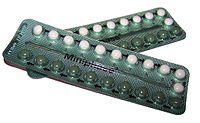
Photo from wikipedia
Estrogen and progesterone regulate the expression of endometrial proteins that determine endometrial receptivity for embryo implantation. The protein disulfide isomerase (PDI) family of proteins play a diverse role in regulating… Click to show full abstract
Estrogen and progesterone regulate the expression of endometrial proteins that determine endometrial receptivity for embryo implantation. The protein disulfide isomerase (PDI) family of proteins play a diverse role in regulating protein modification and redox function. Although the role of PDIs in cancer progression has been widely studied, their role in endometrial receptivity is largely unknown. We have focused on the expressions of PDIA1, PDIA2, PDIA3, PDIA4, PDIA5, and PDIA6 isoforms in endometrial epithelium under the influence of estrogen and progesterone and investigated their functional role in regulating endometrial receptivity. We found PDIA1-6 transcripts were expressed in endometrial epithelial Ishikawa, RL95-2, AN3CA, and HEC1-B cell lines. The expression of PDIA1 was low and PDIA5 was high in HEC1-B cells, whereas PDIA2 was high in both AN3CA and HEC1-B cells. In Ishikawa cells, estrogen (10 and 100 nM) upregulated PDIA1 and PDIA6, whereas estrogen (100 nM) downregulated PDIA4 and PDIA5; and progesterone (0.1 and 1 μM) downregulated transcript expressions of PDIA1-6. In human endometrial samples, significantly lowered transcript expressions of PDIA2 and PDIA5 were observed in the secretory phase compared with the proliferative phase, whereas no change was observed in the other studied transcripts throughout the cycle. Inhibition of PDI by PDI antibody (5 and 10 μg/mL) and PDI inhibitor bacitracin (1 and 5 mM) significantly increased the attachment of Jeg-3 spheroids onto AN3CA cells. Taken together, our study suggests a role of PDI in regulating endometrial receptivity and the possibility of using PDI inhibitors to enhance endometrial receptivity.
Journal Title: Reproductive biology
Year Published: 2021
Link to full text (if available)
Share on Social Media: Sign Up to like & get
recommendations!